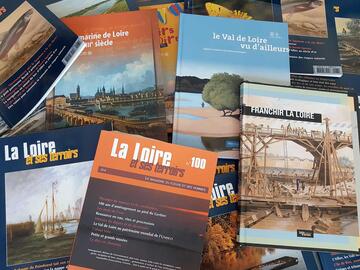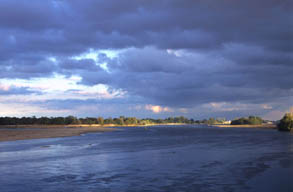The creation of the International Institute for Rivers and Cultural Heritage under the aegis of UNESCO is the result of consultations which have been ongoing since 2001. There are two dimensions to the Institute, one local and the other global.
Aim
The aim of the International
Institute for Rivers and Cultural Heritage, set up under UNESCO, is
to mobilise the research and training potential of the universities
in the Val de Loire and the training and/or research and
engineering establishments located within the World Heritage site
or surrounding area. Its aim is to participate in the worldwide
effort to protect, manage and develop the natural and cultural
heritage of our river corridors.
Within this general framework, the
Institute has identified four key aims:
-
Identify and establish specific
initial and ongoing training courses
-
Set up engineering and research
projects, notably to benefit developing countries
-
Encourage and support academic or
applied research
-
Develop and fund research
works
Mission
and activities
Fund, disseminate
and promote research and projects
The mission of the Institute is to
fund, disseminate and promote research and projects. It aims to
ensure widespread dissemination of existing research works,
projects, practices and usage in order to promote their development
and access to them.
Some of its key activities are
to:
-
Publish and disseminate existing research works
-
Identify and develop innovative research, training and
projects
-
Organise events aimed at specialists and non-specialised
target groups involved in activities related to conservation
and safeguarding cultural heritage
Encourage and
develop research and project management
The Institute actively supports
projects aimed at managing cultural heritage through three types of
activities:
-
Encouraging exchange programmes
by granting international bursaries. Young researchers from
other countries will be welcomed to France and young French
researchers will be encouraged to pursue their work abroad. The
best pieces of work will be awarded prizes and published.
-
Offering resident posts to
lecturers and researchers from other countries who are involved
in supervising research and who can give classes and lectures
as well as carrying out research.
-
Assistance in setting up two
types of projects:
-
Be a focal point
for scientific and technical skills
The Institute will be a focal point
for skills drawn from:
-
numerous teams of scientists
attached to higher education and research establishments
-
engineering departments of public
and private industrial organisations
-
technical departments in local
government authorities
-
various specialist
associations.
Its aim is to support the development
of basic or applied studies in the following areas:
-
risk management
-
navigability, river ecology
-
pollution
-
conservation of water
biodiversity
-
water resources
-
archaeological and ethnographic
research
-
agronomy
-
planning
-
amenity provision
-
industrial archaeology
-
development
-
promotion and management of
cultural heritage
-
tourism development
A new kind of
training
These training programmes, offered in
the form of specific courses, are scheduled to be in place at the
start of the 2005 academic year.
The Institute is offering a selection
of high level courses (Masters, PhD) created by its partner
institutions. Qualifications are awarded by the university members
of the partnership. Places will be awarded to students who
have already taken a first degree or masters. They are
particularly well suited to international researchers who wish to
be trained in the areas covered by the Rivers and Cultural Heritage
initiative:
-
Understanding environments and
landscapes
-
Conservation, preservation and
restoration of cultural heritage
-
Management and development of
tourism, culture and the local economy
These courses are open to students
wanting to pursue both initial and ongoing training.
Courses are offered in the following
sectors:
-
Functioning and engineering of
river systems
-
Ecology of fresh water
environments – biodiversity management
-
Development and management of
natural areas
-
Local management of heritage
sites
-
Developing the tourism potential
of cultural heritage
Each of the specialisms within the
themes will be offered in one or more of the 4 university towns
along the Loire valley.
Timescale
The launch of the International
Institute for Rivers and Cultural Heritage is scheduled for
2005.
Training courses will be offered from
the start of the 2005 academic year.
Partners
The Institute's main partners are as
follows:
Pays de la
Loire region
UNESCO
University
of Nantes
University
of Angers
Western Catholic
University in Angers
University of
Tours
University
of Orléans
University of
Orléans
University of Tours
University of Angers
Western Catholic University in
Angers
University of Nantes
Action priorities

